Supporting Independent Living with Technology in NHS
VerifiedAdded on 2023/01/19
|14
|4144
|66
AI Summary
This report explores the use of technology to support independent living in the National Health Services (NHS). It discusses how technology is used by supporters of health and care, the barriers to using technology, the benefits of technological developments for NHS and its users, health and safety considerations, ethical considerations, and the impact of recent technological developments on healthcare services. The report also identifies the specific needs of individuals requiring support to live independently and provides recommendations on how technology can support independent living arrangements.
Contribute Materials
Your contribution can guide someone’s learning journey. Share your
documents today.
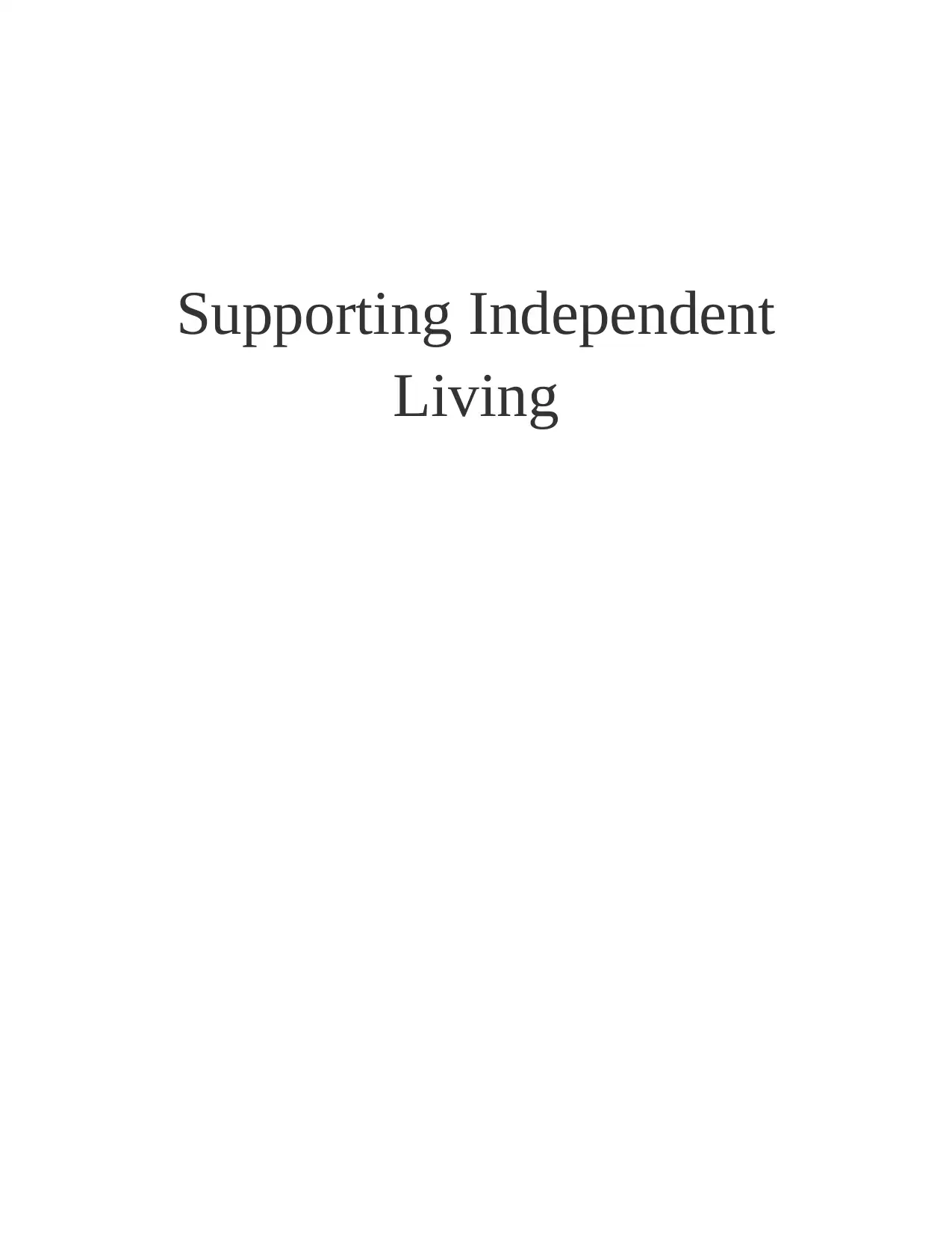
Supporting Independent
Living
Living
Secure Best Marks with AI Grader
Need help grading? Try our AI Grader for instant feedback on your assignments.
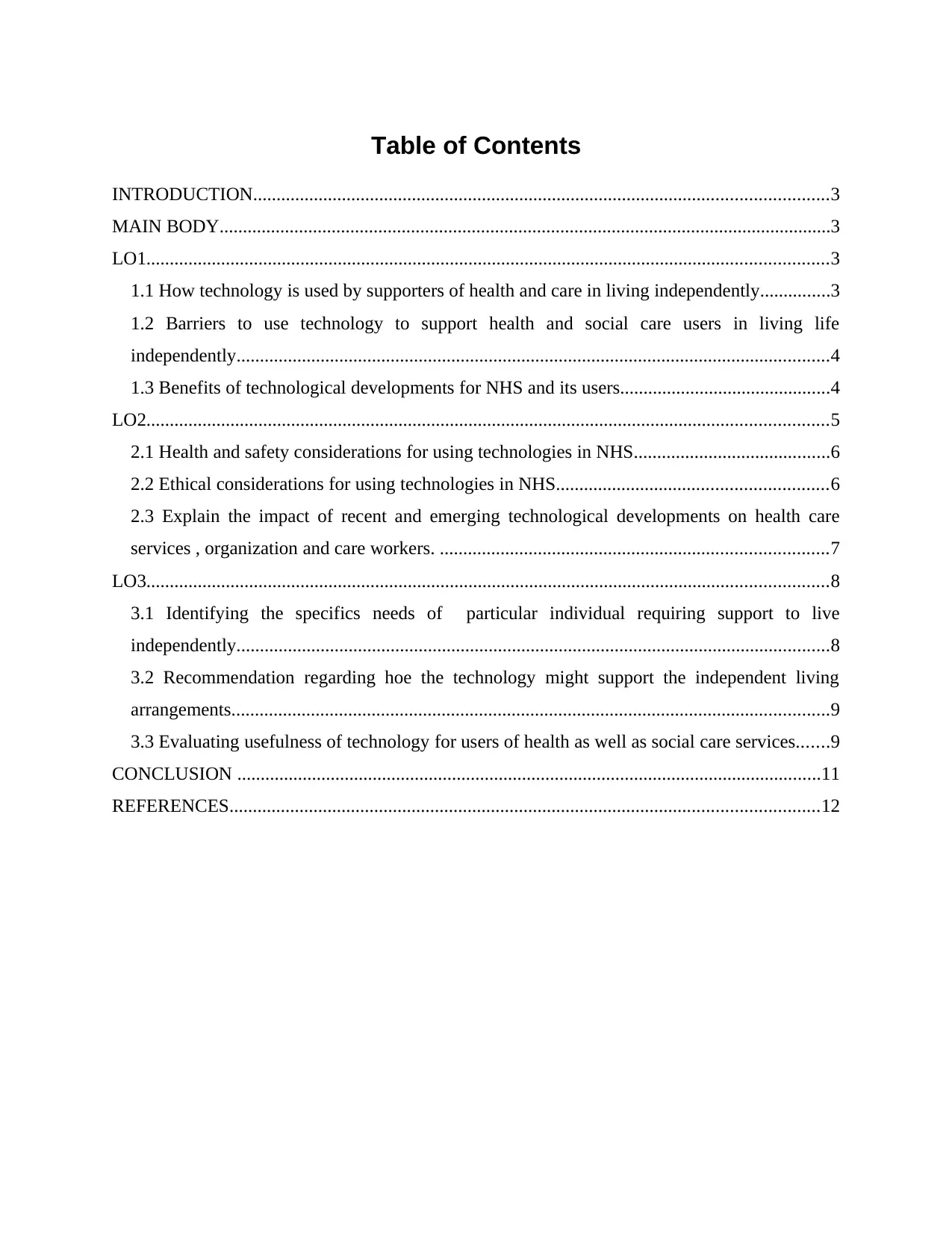
Table of Contents
INTRODUCTION...........................................................................................................................3
MAIN BODY...................................................................................................................................3
LO1..................................................................................................................................................3
1.1 How technology is used by supporters of health and care in living independently...............3
1.2 Barriers to use technology to support health and social care users in living life
independently...............................................................................................................................4
1.3 Benefits of technological developments for NHS and its users.............................................4
LO2..................................................................................................................................................5
2.1 Health and safety considerations for using technologies in NHS..........................................6
2.2 Ethical considerations for using technologies in NHS..........................................................6
2.3 Explain the impact of recent and emerging technological developments on health care
services , organization and care workers. ...................................................................................7
LO3..................................................................................................................................................8
3.1 Identifying the specifics needs of particular individual requiring support to live
independently...............................................................................................................................8
3.2 Recommendation regarding hoe the technology might support the independent living
arrangements................................................................................................................................9
3.3 Evaluating usefulness of technology for users of health as well as social care services.......9
CONCLUSION .............................................................................................................................11
REFERENCES..............................................................................................................................12
INTRODUCTION...........................................................................................................................3
MAIN BODY...................................................................................................................................3
LO1..................................................................................................................................................3
1.1 How technology is used by supporters of health and care in living independently...............3
1.2 Barriers to use technology to support health and social care users in living life
independently...............................................................................................................................4
1.3 Benefits of technological developments for NHS and its users.............................................4
LO2..................................................................................................................................................5
2.1 Health and safety considerations for using technologies in NHS..........................................6
2.2 Ethical considerations for using technologies in NHS..........................................................6
2.3 Explain the impact of recent and emerging technological developments on health care
services , organization and care workers. ...................................................................................7
LO3..................................................................................................................................................8
3.1 Identifying the specifics needs of particular individual requiring support to live
independently...............................................................................................................................8
3.2 Recommendation regarding hoe the technology might support the independent living
arrangements................................................................................................................................9
3.3 Evaluating usefulness of technology for users of health as well as social care services.......9
CONCLUSION .............................................................................................................................11
REFERENCES..............................................................................................................................12
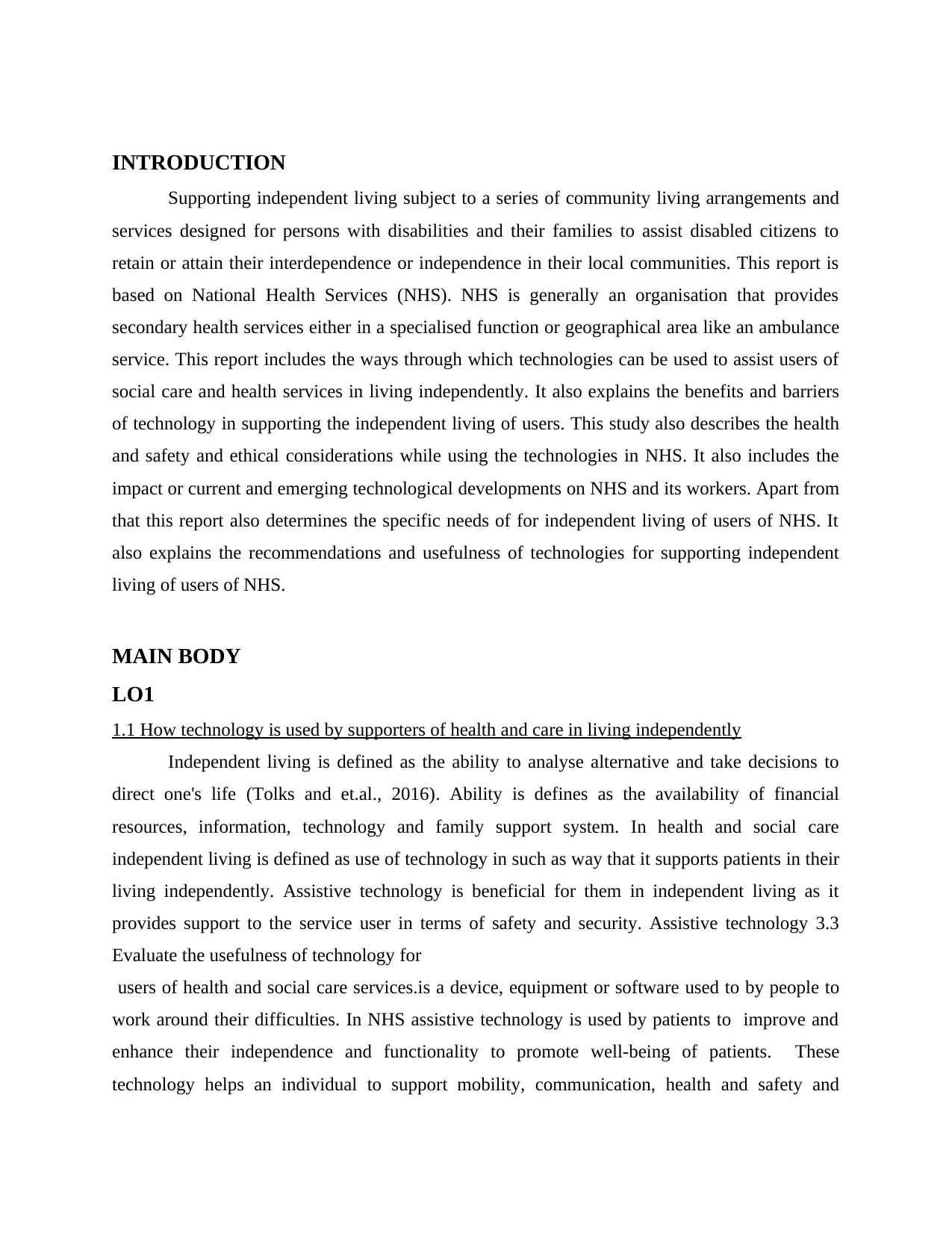
INTRODUCTION
Supporting independent living subject to a series of community living arrangements and
services designed for persons with disabilities and their families to assist disabled citizens to
retain or attain their interdependence or independence in their local communities. This report is
based on National Health Services (NHS). NHS is generally an organisation that provides
secondary health services either in a specialised function or geographical area like an ambulance
service. This report includes the ways through which technologies can be used to assist users of
social care and health services in living independently. It also explains the benefits and barriers
of technology in supporting the independent living of users. This study also describes the health
and safety and ethical considerations while using the technologies in NHS. It also includes the
impact or current and emerging technological developments on NHS and its workers. Apart from
that this report also determines the specific needs of for independent living of users of NHS. It
also explains the recommendations and usefulness of technologies for supporting independent
living of users of NHS.
MAIN BODY
LO1
1.1 How technology is used by supporters of health and care in living independently
Independent living is defined as the ability to analyse alternative and take decisions to
direct one's life (Tolks and et.al., 2016). Ability is defines as the availability of financial
resources, information, technology and family support system. In health and social care
independent living is defined as use of technology in such as way that it supports patients in their
living independently. Assistive technology is beneficial for them in independent living as it
provides support to the service user in terms of safety and security. Assistive technology 3.3
Evaluate the usefulness of technology for
users of health and social care services.is a device, equipment or software used to by people to
work around their difficulties. In NHS assistive technology is used by patients to improve and
enhance their independence and functionality to promote well-being of patients. These
technology helps an individual to support mobility, communication, health and safety and
Supporting independent living subject to a series of community living arrangements and
services designed for persons with disabilities and their families to assist disabled citizens to
retain or attain their interdependence or independence in their local communities. This report is
based on National Health Services (NHS). NHS is generally an organisation that provides
secondary health services either in a specialised function or geographical area like an ambulance
service. This report includes the ways through which technologies can be used to assist users of
social care and health services in living independently. It also explains the benefits and barriers
of technology in supporting the independent living of users. This study also describes the health
and safety and ethical considerations while using the technologies in NHS. It also includes the
impact or current and emerging technological developments on NHS and its workers. Apart from
that this report also determines the specific needs of for independent living of users of NHS. It
also explains the recommendations and usefulness of technologies for supporting independent
living of users of NHS.
MAIN BODY
LO1
1.1 How technology is used by supporters of health and care in living independently
Independent living is defined as the ability to analyse alternative and take decisions to
direct one's life (Tolks and et.al., 2016). Ability is defines as the availability of financial
resources, information, technology and family support system. In health and social care
independent living is defined as use of technology in such as way that it supports patients in their
living independently. Assistive technology is beneficial for them in independent living as it
provides support to the service user in terms of safety and security. Assistive technology 3.3
Evaluate the usefulness of technology for
users of health and social care services.is a device, equipment or software used to by people to
work around their difficulties. In NHS assistive technology is used by patients to improve and
enhance their independence and functionality to promote well-being of patients. These
technology helps an individual to support mobility, communication, health and safety and
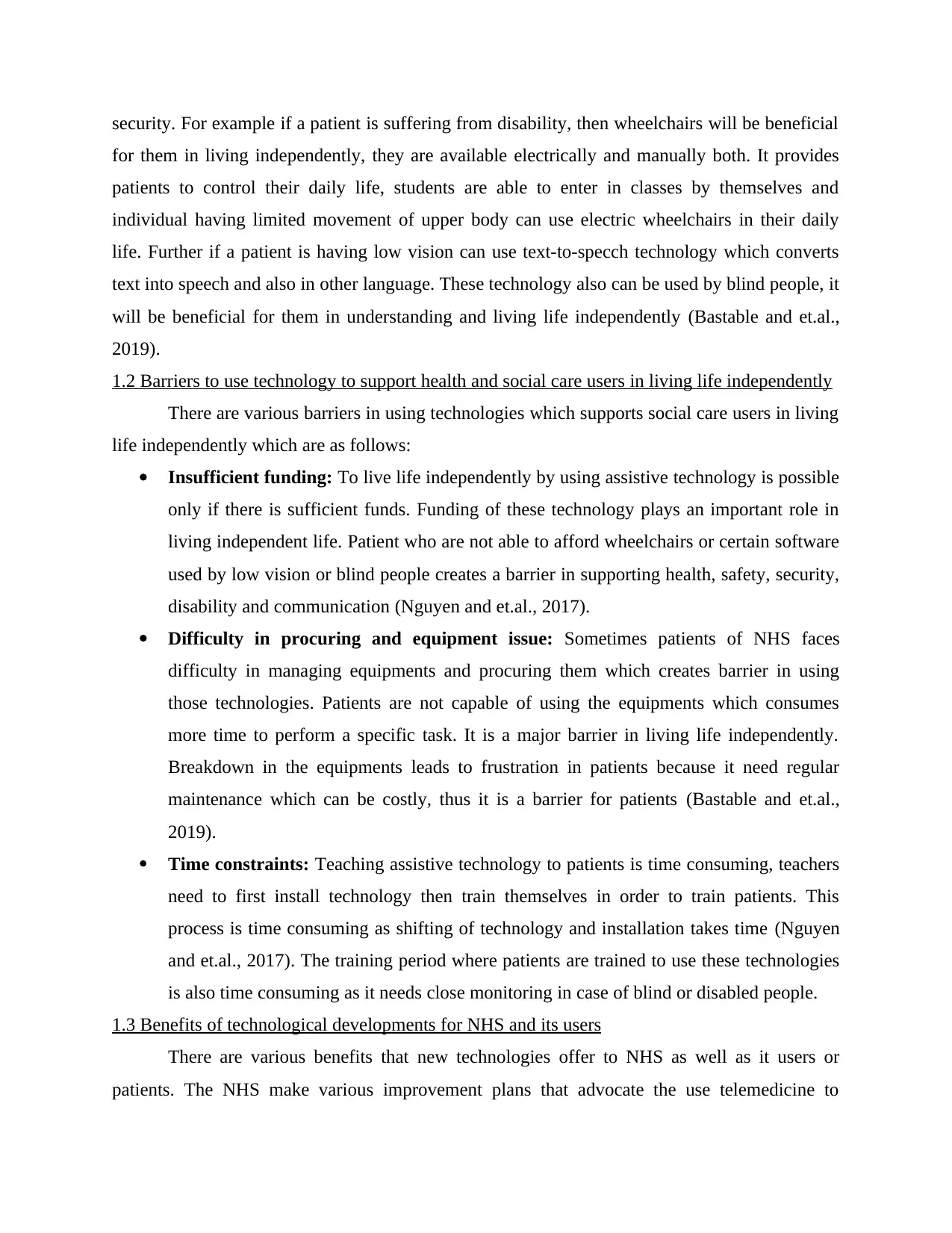
security. For example if a patient is suffering from disability, then wheelchairs will be beneficial
for them in living independently, they are available electrically and manually both. It provides
patients to control their daily life, students are able to enter in classes by themselves and
individual having limited movement of upper body can use electric wheelchairs in their daily
life. Further if a patient is having low vision can use text-to-specch technology which converts
text into speech and also in other language. These technology also can be used by blind people, it
will be beneficial for them in understanding and living life independently (Bastable and et.al.,
2019).
1.2 Barriers to use technology to support health and social care users in living life independently
There are various barriers in using technologies which supports social care users in living
life independently which are as follows:
Insufficient funding: To live life independently by using assistive technology is possible
only if there is sufficient funds. Funding of these technology plays an important role in
living independent life. Patient who are not able to afford wheelchairs or certain software
used by low vision or blind people creates a barrier in supporting health, safety, security,
disability and communication (Nguyen and et.al., 2017).
Difficulty in procuring and equipment issue: Sometimes patients of NHS faces
difficulty in managing equipments and procuring them which creates barrier in using
those technologies. Patients are not capable of using the equipments which consumes
more time to perform a specific task. It is a major barrier in living life independently.
Breakdown in the equipments leads to frustration in patients because it need regular
maintenance which can be costly, thus it is a barrier for patients (Bastable and et.al.,
2019).
Time constraints: Teaching assistive technology to patients is time consuming, teachers
need to first install technology then train themselves in order to train patients. This
process is time consuming as shifting of technology and installation takes time (Nguyen
and et.al., 2017). The training period where patients are trained to use these technologies
is also time consuming as it needs close monitoring in case of blind or disabled people.
1.3 Benefits of technological developments for NHS and its users
There are various benefits that new technologies offer to NHS as well as it users or
patients. The NHS make various improvement plans that advocate the use telemedicine to
for them in living independently, they are available electrically and manually both. It provides
patients to control their daily life, students are able to enter in classes by themselves and
individual having limited movement of upper body can use electric wheelchairs in their daily
life. Further if a patient is having low vision can use text-to-specch technology which converts
text into speech and also in other language. These technology also can be used by blind people, it
will be beneficial for them in understanding and living life independently (Bastable and et.al.,
2019).
1.2 Barriers to use technology to support health and social care users in living life independently
There are various barriers in using technologies which supports social care users in living
life independently which are as follows:
Insufficient funding: To live life independently by using assistive technology is possible
only if there is sufficient funds. Funding of these technology plays an important role in
living independent life. Patient who are not able to afford wheelchairs or certain software
used by low vision or blind people creates a barrier in supporting health, safety, security,
disability and communication (Nguyen and et.al., 2017).
Difficulty in procuring and equipment issue: Sometimes patients of NHS faces
difficulty in managing equipments and procuring them which creates barrier in using
those technologies. Patients are not capable of using the equipments which consumes
more time to perform a specific task. It is a major barrier in living life independently.
Breakdown in the equipments leads to frustration in patients because it need regular
maintenance which can be costly, thus it is a barrier for patients (Bastable and et.al.,
2019).
Time constraints: Teaching assistive technology to patients is time consuming, teachers
need to first install technology then train themselves in order to train patients. This
process is time consuming as shifting of technology and installation takes time (Nguyen
and et.al., 2017). The training period where patients are trained to use these technologies
is also time consuming as it needs close monitoring in case of blind or disabled people.
1.3 Benefits of technological developments for NHS and its users
There are various benefits that new technologies offer to NHS as well as it users or
patients. The NHS make various improvement plans that advocate the use telemedicine to
Secure Best Marks with AI Grader
Need help grading? Try our AI Grader for instant feedback on your assignments.
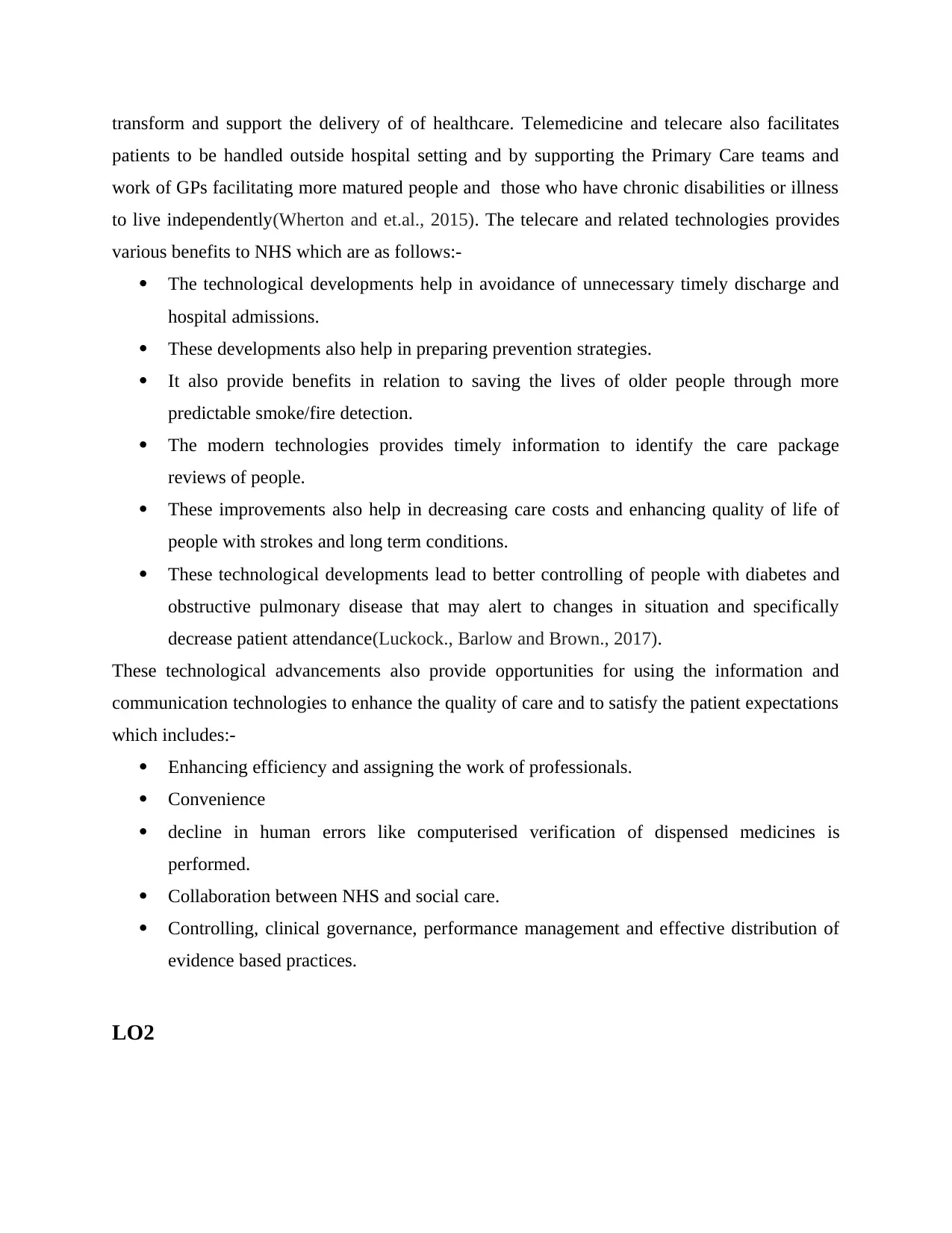
transform and support the delivery of of healthcare. Telemedicine and telecare also facilitates
patients to be handled outside hospital setting and by supporting the Primary Care teams and
work of GPs facilitating more matured people and those who have chronic disabilities or illness
to live independently(Wherton and et.al., 2015). The telecare and related technologies provides
various benefits to NHS which are as follows:-
The technological developments help in avoidance of unnecessary timely discharge and
hospital admissions.
These developments also help in preparing prevention strategies.
It also provide benefits in relation to saving the lives of older people through more
predictable smoke/fire detection.
The modern technologies provides timely information to identify the care package
reviews of people.
These improvements also help in decreasing care costs and enhancing quality of life of
people with strokes and long term conditions.
These technological developments lead to better controlling of people with diabetes and
obstructive pulmonary disease that may alert to changes in situation and specifically
decrease patient attendance(Luckock., Barlow and Brown., 2017).
These technological advancements also provide opportunities for using the information and
communication technologies to enhance the quality of care and to satisfy the patient expectations
which includes:-
Enhancing efficiency and assigning the work of professionals.
Convenience
decline in human errors like computerised verification of dispensed medicines is
performed.
Collaboration between NHS and social care.
Controlling, clinical governance, performance management and effective distribution of
evidence based practices.
LO2
patients to be handled outside hospital setting and by supporting the Primary Care teams and
work of GPs facilitating more matured people and those who have chronic disabilities or illness
to live independently(Wherton and et.al., 2015). The telecare and related technologies provides
various benefits to NHS which are as follows:-
The technological developments help in avoidance of unnecessary timely discharge and
hospital admissions.
These developments also help in preparing prevention strategies.
It also provide benefits in relation to saving the lives of older people through more
predictable smoke/fire detection.
The modern technologies provides timely information to identify the care package
reviews of people.
These improvements also help in decreasing care costs and enhancing quality of life of
people with strokes and long term conditions.
These technological developments lead to better controlling of people with diabetes and
obstructive pulmonary disease that may alert to changes in situation and specifically
decrease patient attendance(Luckock., Barlow and Brown., 2017).
These technological advancements also provide opportunities for using the information and
communication technologies to enhance the quality of care and to satisfy the patient expectations
which includes:-
Enhancing efficiency and assigning the work of professionals.
Convenience
decline in human errors like computerised verification of dispensed medicines is
performed.
Collaboration between NHS and social care.
Controlling, clinical governance, performance management and effective distribution of
evidence based practices.
LO2
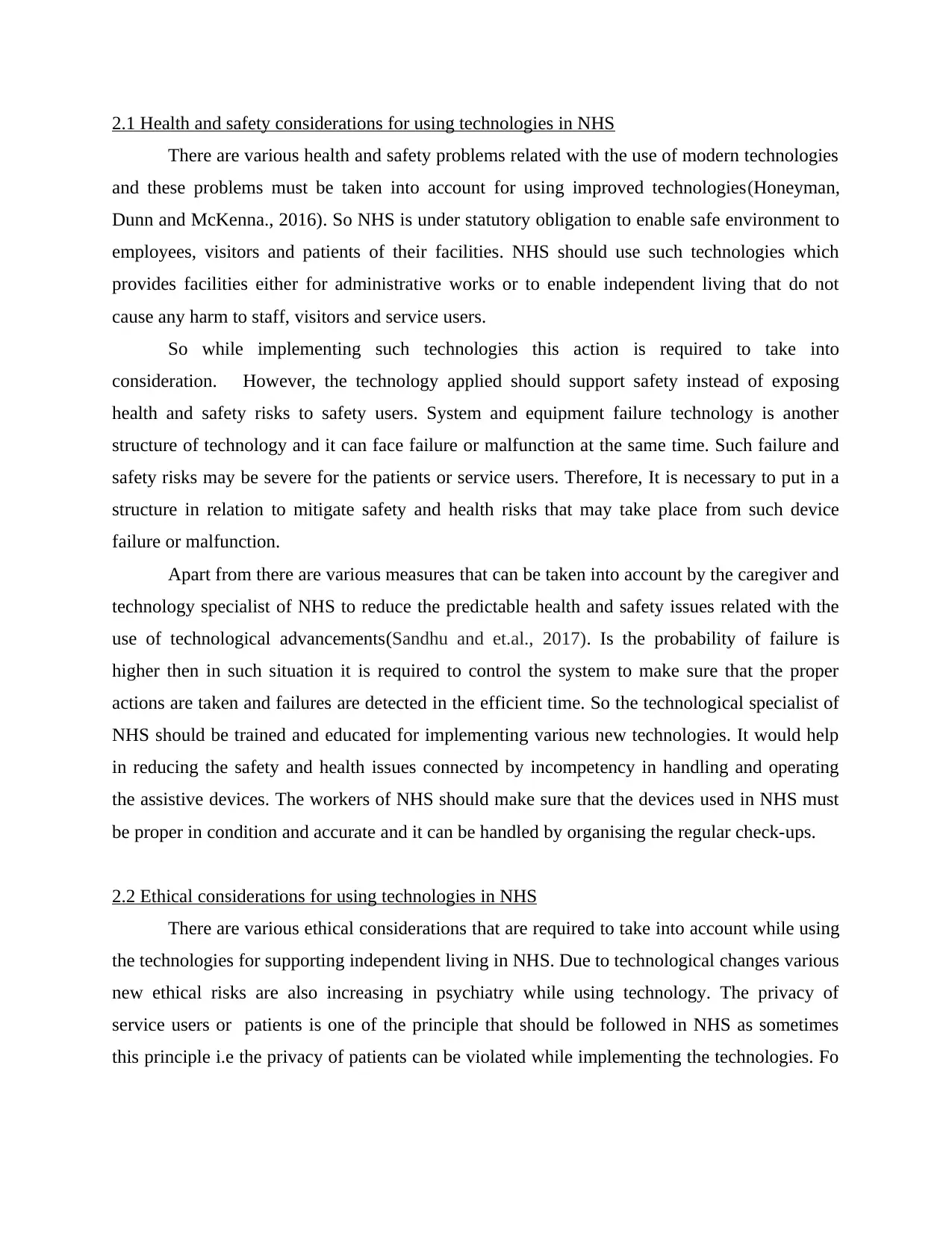
2.1 Health and safety considerations for using technologies in NHS
There are various health and safety problems related with the use of modern technologies
and these problems must be taken into account for using improved technologies(Honeyman,
Dunn and McKenna., 2016). So NHS is under statutory obligation to enable safe environment to
employees, visitors and patients of their facilities. NHS should use such technologies which
provides facilities either for administrative works or to enable independent living that do not
cause any harm to staff, visitors and service users.
So while implementing such technologies this action is required to take into
consideration. However, the technology applied should support safety instead of exposing
health and safety risks to safety users. System and equipment failure technology is another
structure of technology and it can face failure or malfunction at the same time. Such failure and
safety risks may be severe for the patients or service users. Therefore, It is necessary to put in a
structure in relation to mitigate safety and health risks that may take place from such device
failure or malfunction.
Apart from there are various measures that can be taken into account by the caregiver and
technology specialist of NHS to reduce the predictable health and safety issues related with the
use of technological advancements(Sandhu and et.al., 2017). Is the probability of failure is
higher then in such situation it is required to control the system to make sure that the proper
actions are taken and failures are detected in the efficient time. So the technological specialist of
NHS should be trained and educated for implementing various new technologies. It would help
in reducing the safety and health issues connected by incompetency in handling and operating
the assistive devices. The workers of NHS should make sure that the devices used in NHS must
be proper in condition and accurate and it can be handled by organising the regular check-ups.
2.2 Ethical considerations for using technologies in NHS
There are various ethical considerations that are required to take into account while using
the technologies for supporting independent living in NHS. Due to technological changes various
new ethical risks are also increasing in psychiatry while using technology. The privacy of
service users or patients is one of the principle that should be followed in NHS as sometimes
this principle i.e the privacy of patients can be violated while implementing the technologies. Fo
There are various health and safety problems related with the use of modern technologies
and these problems must be taken into account for using improved technologies(Honeyman,
Dunn and McKenna., 2016). So NHS is under statutory obligation to enable safe environment to
employees, visitors and patients of their facilities. NHS should use such technologies which
provides facilities either for administrative works or to enable independent living that do not
cause any harm to staff, visitors and service users.
So while implementing such technologies this action is required to take into
consideration. However, the technology applied should support safety instead of exposing
health and safety risks to safety users. System and equipment failure technology is another
structure of technology and it can face failure or malfunction at the same time. Such failure and
safety risks may be severe for the patients or service users. Therefore, It is necessary to put in a
structure in relation to mitigate safety and health risks that may take place from such device
failure or malfunction.
Apart from there are various measures that can be taken into account by the caregiver and
technology specialist of NHS to reduce the predictable health and safety issues related with the
use of technological advancements(Sandhu and et.al., 2017). Is the probability of failure is
higher then in such situation it is required to control the system to make sure that the proper
actions are taken and failures are detected in the efficient time. So the technological specialist of
NHS should be trained and educated for implementing various new technologies. It would help
in reducing the safety and health issues connected by incompetency in handling and operating
the assistive devices. The workers of NHS should make sure that the devices used in NHS must
be proper in condition and accurate and it can be handled by organising the regular check-ups.
2.2 Ethical considerations for using technologies in NHS
There are various ethical considerations that are required to take into account while using
the technologies for supporting independent living in NHS. Due to technological changes various
new ethical risks are also increasing in psychiatry while using technology. The privacy of
service users or patients is one of the principle that should be followed in NHS as sometimes
this principle i.e the privacy of patients can be violated while implementing the technologies. Fo
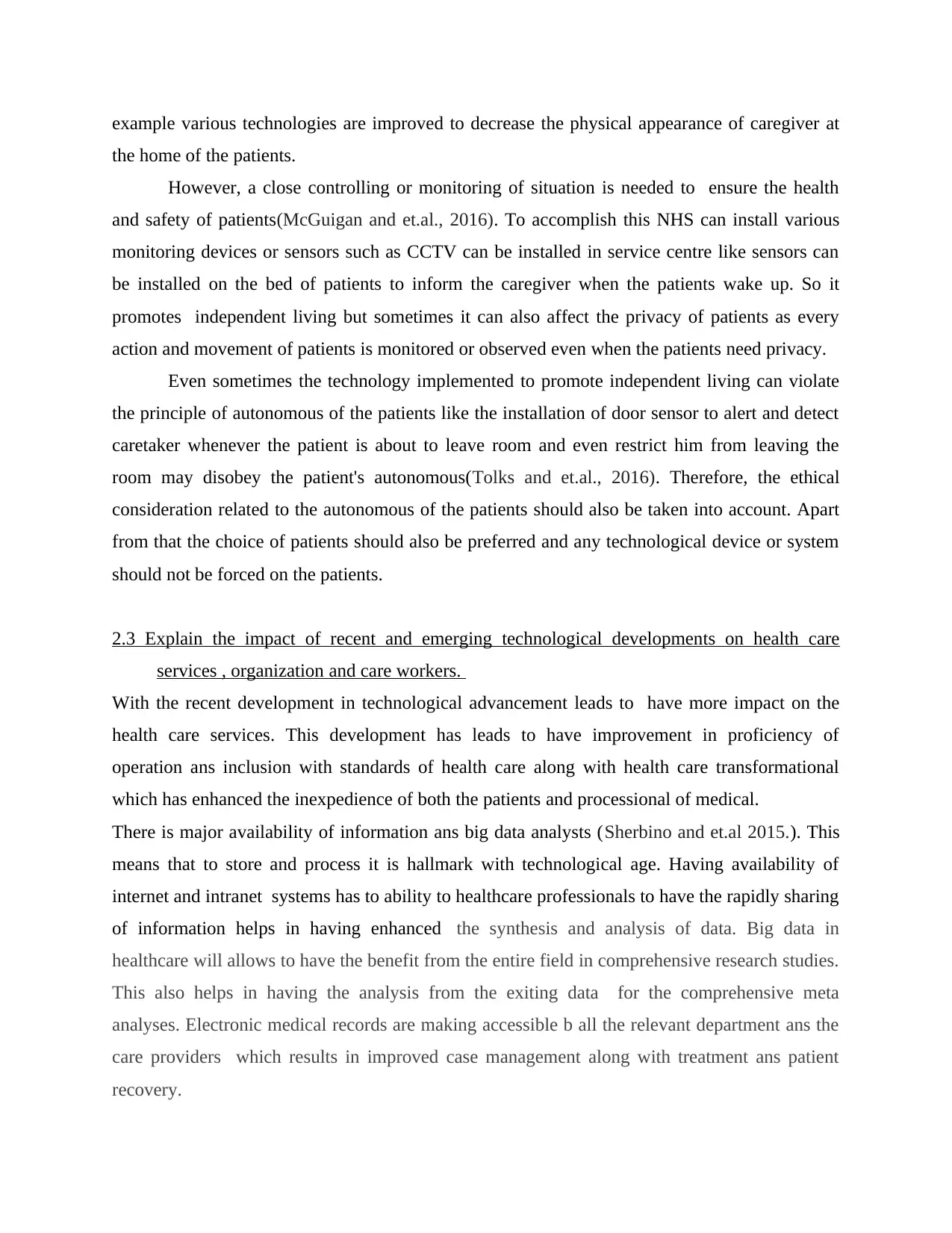
example various technologies are improved to decrease the physical appearance of caregiver at
the home of the patients.
However, a close controlling or monitoring of situation is needed to ensure the health
and safety of patients(McGuigan and et.al., 2016). To accomplish this NHS can install various
monitoring devices or sensors such as CCTV can be installed in service centre like sensors can
be installed on the bed of patients to inform the caregiver when the patients wake up. So it
promotes independent living but sometimes it can also affect the privacy of patients as every
action and movement of patients is monitored or observed even when the patients need privacy.
Even sometimes the technology implemented to promote independent living can violate
the principle of autonomous of the patients like the installation of door sensor to alert and detect
caretaker whenever the patient is about to leave room and even restrict him from leaving the
room may disobey the patient's autonomous(Tolks and et.al., 2016). Therefore, the ethical
consideration related to the autonomous of the patients should also be taken into account. Apart
from that the choice of patients should also be preferred and any technological device or system
should not be forced on the patients.
2.3 Explain the impact of recent and emerging technological developments on health care
services , organization and care workers.
With the recent development in technological advancement leads to have more impact on the
health care services. This development has leads to have improvement in proficiency of
operation ans inclusion with standards of health care along with health care transformational
which has enhanced the inexpedience of both the patients and processional of medical.
There is major availability of information ans big data analysts (Sherbino and et.al 2015.). This
means that to store and process it is hallmark with technological age. Having availability of
internet and intranet systems has to ability to healthcare professionals to have the rapidly sharing
of information helps in having enhanced the synthesis and analysis of data. Big data in
healthcare will allows to have the benefit from the entire field in comprehensive research studies.
This also helps in having the analysis from the exiting data for the comprehensive meta
analyses. Electronic medical records are making accessible b all the relevant department ans the
care providers which results in improved case management along with treatment ans patient
recovery.
the home of the patients.
However, a close controlling or monitoring of situation is needed to ensure the health
and safety of patients(McGuigan and et.al., 2016). To accomplish this NHS can install various
monitoring devices or sensors such as CCTV can be installed in service centre like sensors can
be installed on the bed of patients to inform the caregiver when the patients wake up. So it
promotes independent living but sometimes it can also affect the privacy of patients as every
action and movement of patients is monitored or observed even when the patients need privacy.
Even sometimes the technology implemented to promote independent living can violate
the principle of autonomous of the patients like the installation of door sensor to alert and detect
caretaker whenever the patient is about to leave room and even restrict him from leaving the
room may disobey the patient's autonomous(Tolks and et.al., 2016). Therefore, the ethical
consideration related to the autonomous of the patients should also be taken into account. Apart
from that the choice of patients should also be preferred and any technological device or system
should not be forced on the patients.
2.3 Explain the impact of recent and emerging technological developments on health care
services , organization and care workers.
With the recent development in technological advancement leads to have more impact on the
health care services. This development has leads to have improvement in proficiency of
operation ans inclusion with standards of health care along with health care transformational
which has enhanced the inexpedience of both the patients and processional of medical.
There is major availability of information ans big data analysts (Sherbino and et.al 2015.). This
means that to store and process it is hallmark with technological age. Having availability of
internet and intranet systems has to ability to healthcare professionals to have the rapidly sharing
of information helps in having enhanced the synthesis and analysis of data. Big data in
healthcare will allows to have the benefit from the entire field in comprehensive research studies.
This also helps in having the analysis from the exiting data for the comprehensive meta
analyses. Electronic medical records are making accessible b all the relevant department ans the
care providers which results in improved case management along with treatment ans patient
recovery.
Paraphrase This Document
Need a fresh take? Get an instant paraphrase of this document with our AI Paraphraser
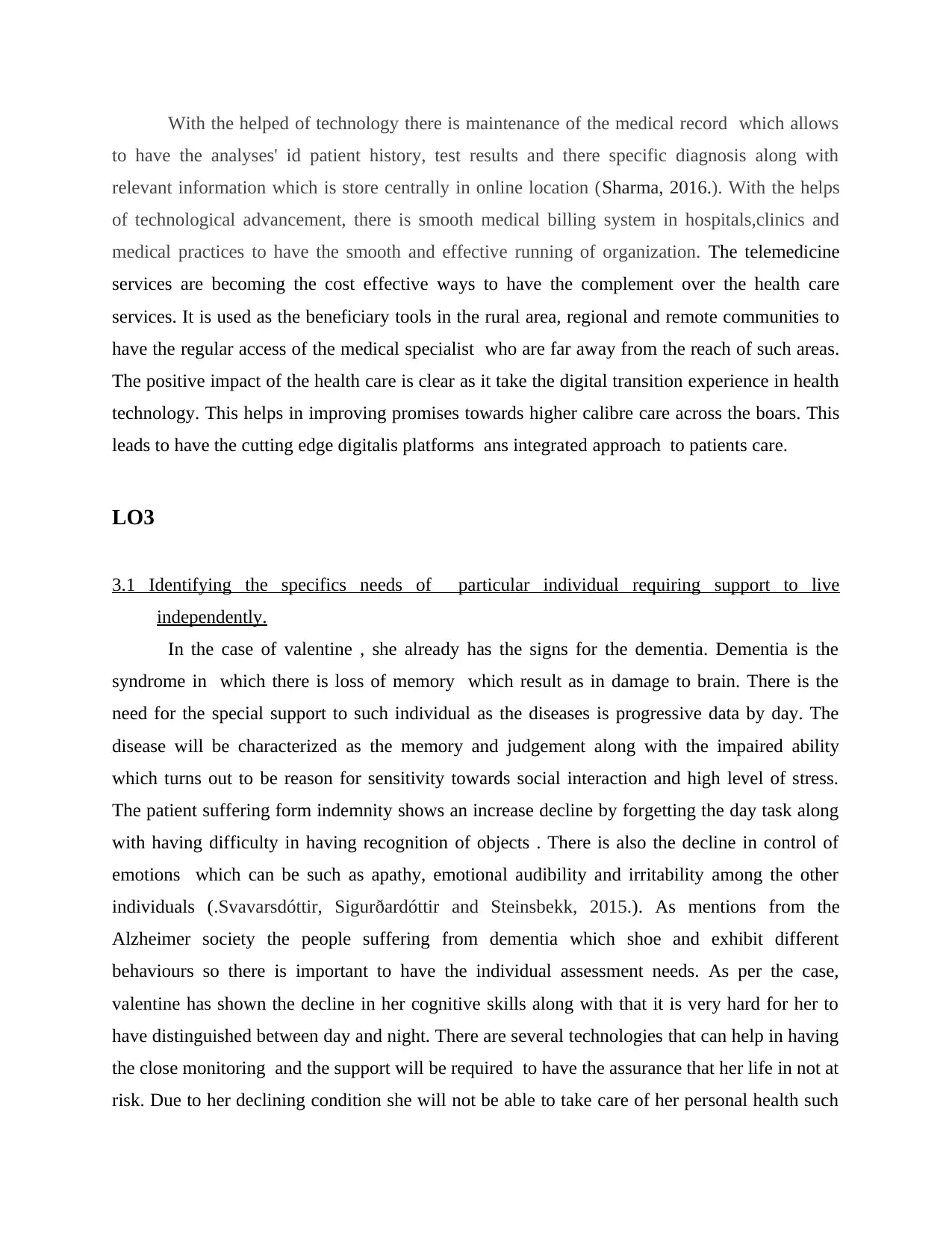
With the helped of technology there is maintenance of the medical record which allows
to have the analyses' id patient history, test results and there specific diagnosis along with
relevant information which is store centrally in online location (Sharma, 2016.). With the helps
of technological advancement, there is smooth medical billing system in hospitals,clinics and
medical practices to have the smooth and effective running of organization. The telemedicine
services are becoming the cost effective ways to have the complement over the health care
services. It is used as the beneficiary tools in the rural area, regional and remote communities to
have the regular access of the medical specialist who are far away from the reach of such areas.
The positive impact of the health care is clear as it take the digital transition experience in health
technology. This helps in improving promises towards higher calibre care across the boars. This
leads to have the cutting edge digitalis platforms ans integrated approach to patients care.
LO3
3.1 Identifying the specifics needs of particular individual requiring support to live
independently.
In the case of valentine , she already has the signs for the dementia. Dementia is the
syndrome in which there is loss of memory which result as in damage to brain. There is the
need for the special support to such individual as the diseases is progressive data by day. The
disease will be characterized as the memory and judgement along with the impaired ability
which turns out to be reason for sensitivity towards social interaction and high level of stress.
The patient suffering form indemnity shows an increase decline by forgetting the day task along
with having difficulty in having recognition of objects . There is also the decline in control of
emotions which can be such as apathy, emotional audibility and irritability among the other
individuals (.Svavarsdóttir, Sigurðardóttir and Steinsbekk, 2015.). As mentions from the
Alzheimer society the people suffering from dementia which shoe and exhibit different
behaviours so there is important to have the individual assessment needs. As per the case,
valentine has shown the decline in her cognitive skills along with that it is very hard for her to
have distinguished between day and night. There are several technologies that can help in having
the close monitoring and the support will be required to have the assurance that her life in not at
risk. Due to her declining condition she will not be able to take care of her personal health such
to have the analyses' id patient history, test results and there specific diagnosis along with
relevant information which is store centrally in online location (Sharma, 2016.). With the helps
of technological advancement, there is smooth medical billing system in hospitals,clinics and
medical practices to have the smooth and effective running of organization. The telemedicine
services are becoming the cost effective ways to have the complement over the health care
services. It is used as the beneficiary tools in the rural area, regional and remote communities to
have the regular access of the medical specialist who are far away from the reach of such areas.
The positive impact of the health care is clear as it take the digital transition experience in health
technology. This helps in improving promises towards higher calibre care across the boars. This
leads to have the cutting edge digitalis platforms ans integrated approach to patients care.
LO3
3.1 Identifying the specifics needs of particular individual requiring support to live
independently.
In the case of valentine , she already has the signs for the dementia. Dementia is the
syndrome in which there is loss of memory which result as in damage to brain. There is the
need for the special support to such individual as the diseases is progressive data by day. The
disease will be characterized as the memory and judgement along with the impaired ability
which turns out to be reason for sensitivity towards social interaction and high level of stress.
The patient suffering form indemnity shows an increase decline by forgetting the day task along
with having difficulty in having recognition of objects . There is also the decline in control of
emotions which can be such as apathy, emotional audibility and irritability among the other
individuals (.Svavarsdóttir, Sigurðardóttir and Steinsbekk, 2015.). As mentions from the
Alzheimer society the people suffering from dementia which shoe and exhibit different
behaviours so there is important to have the individual assessment needs. As per the case,
valentine has shown the decline in her cognitive skills along with that it is very hard for her to
have distinguished between day and night. There are several technologies that can help in having
the close monitoring and the support will be required to have the assurance that her life in not at
risk. Due to her declining condition she will not be able to take care of her personal health such
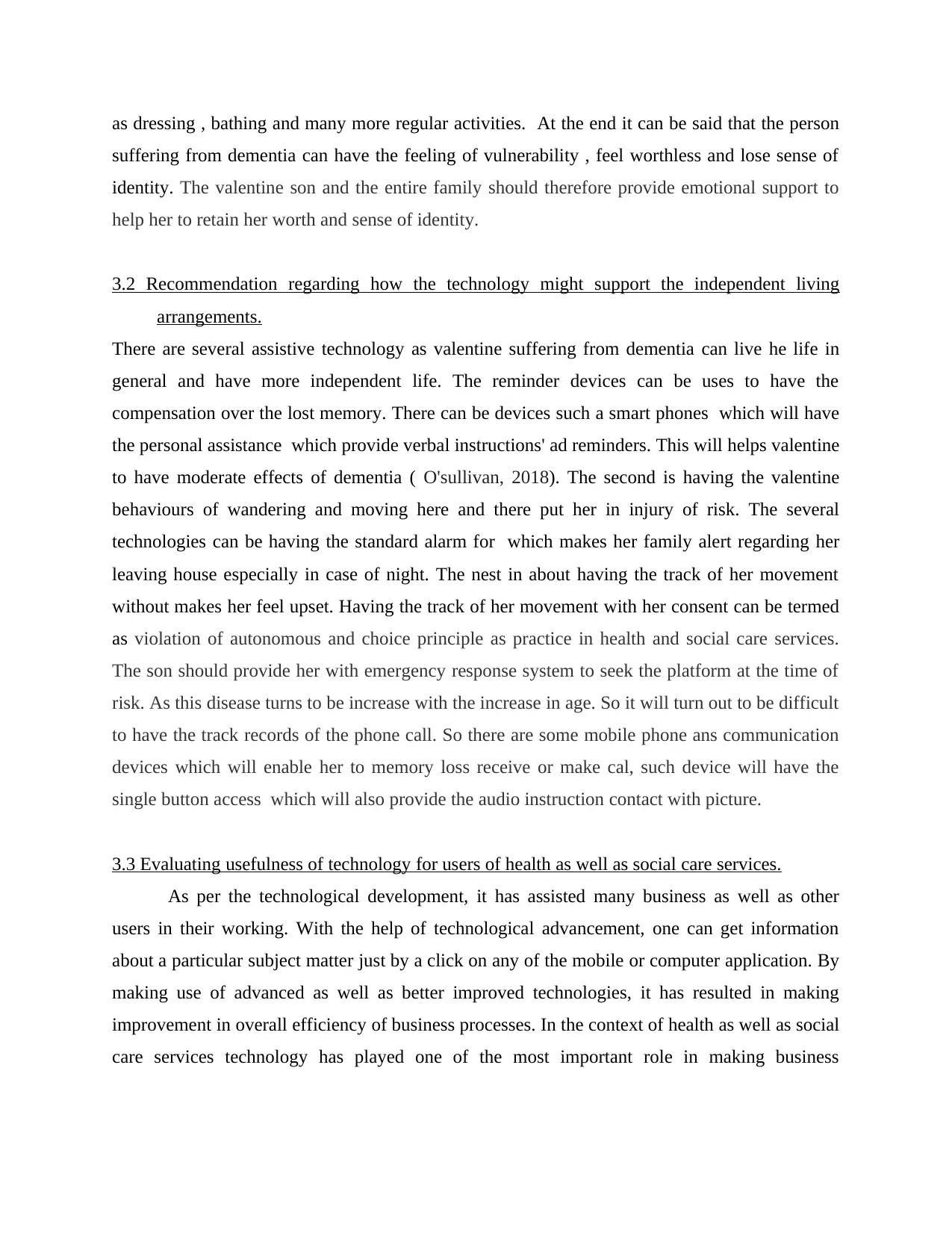
as dressing , bathing and many more regular activities. At the end it can be said that the person
suffering from dementia can have the feeling of vulnerability , feel worthless and lose sense of
identity. The valentine son and the entire family should therefore provide emotional support to
help her to retain her worth and sense of identity.
3.2 Recommendation regarding how the technology might support the independent living
arrangements.
There are several assistive technology as valentine suffering from dementia can live he life in
general and have more independent life. The reminder devices can be uses to have the
compensation over the lost memory. There can be devices such a smart phones which will have
the personal assistance which provide verbal instructions' ad reminders. This will helps valentine
to have moderate effects of dementia ( O'sullivan, 2018). The second is having the valentine
behaviours of wandering and moving here and there put her in injury of risk. The several
technologies can be having the standard alarm for which makes her family alert regarding her
leaving house especially in case of night. The nest in about having the track of her movement
without makes her feel upset. Having the track of her movement with her consent can be termed
as violation of autonomous and choice principle as practice in health and social care services.
The son should provide her with emergency response system to seek the platform at the time of
risk. As this disease turns to be increase with the increase in age. So it will turn out to be difficult
to have the track records of the phone call. So there are some mobile phone ans communication
devices which will enable her to memory loss receive or make cal, such device will have the
single button access which will also provide the audio instruction contact with picture.
3.3 Evaluating usefulness of technology for users of health as well as social care services.
As per the technological development, it has assisted many business as well as other
users in their working. With the help of technological advancement, one can get information
about a particular subject matter just by a click on any of the mobile or computer application. By
making use of advanced as well as better improved technologies, it has resulted in making
improvement in overall efficiency of business processes. In the context of health as well as social
care services technology has played one of the most important role in making business
suffering from dementia can have the feeling of vulnerability , feel worthless and lose sense of
identity. The valentine son and the entire family should therefore provide emotional support to
help her to retain her worth and sense of identity.
3.2 Recommendation regarding how the technology might support the independent living
arrangements.
There are several assistive technology as valentine suffering from dementia can live he life in
general and have more independent life. The reminder devices can be uses to have the
compensation over the lost memory. There can be devices such a smart phones which will have
the personal assistance which provide verbal instructions' ad reminders. This will helps valentine
to have moderate effects of dementia ( O'sullivan, 2018). The second is having the valentine
behaviours of wandering and moving here and there put her in injury of risk. The several
technologies can be having the standard alarm for which makes her family alert regarding her
leaving house especially in case of night. The nest in about having the track of her movement
without makes her feel upset. Having the track of her movement with her consent can be termed
as violation of autonomous and choice principle as practice in health and social care services.
The son should provide her with emergency response system to seek the platform at the time of
risk. As this disease turns to be increase with the increase in age. So it will turn out to be difficult
to have the track records of the phone call. So there are some mobile phone ans communication
devices which will enable her to memory loss receive or make cal, such device will have the
single button access which will also provide the audio instruction contact with picture.
3.3 Evaluating usefulness of technology for users of health as well as social care services.
As per the technological development, it has assisted many business as well as other
users in their working. With the help of technological advancement, one can get information
about a particular subject matter just by a click on any of the mobile or computer application. By
making use of advanced as well as better improved technologies, it has resulted in making
improvement in overall efficiency of business processes. In the context of health as well as social
care services technology has played one of the most important role in making business
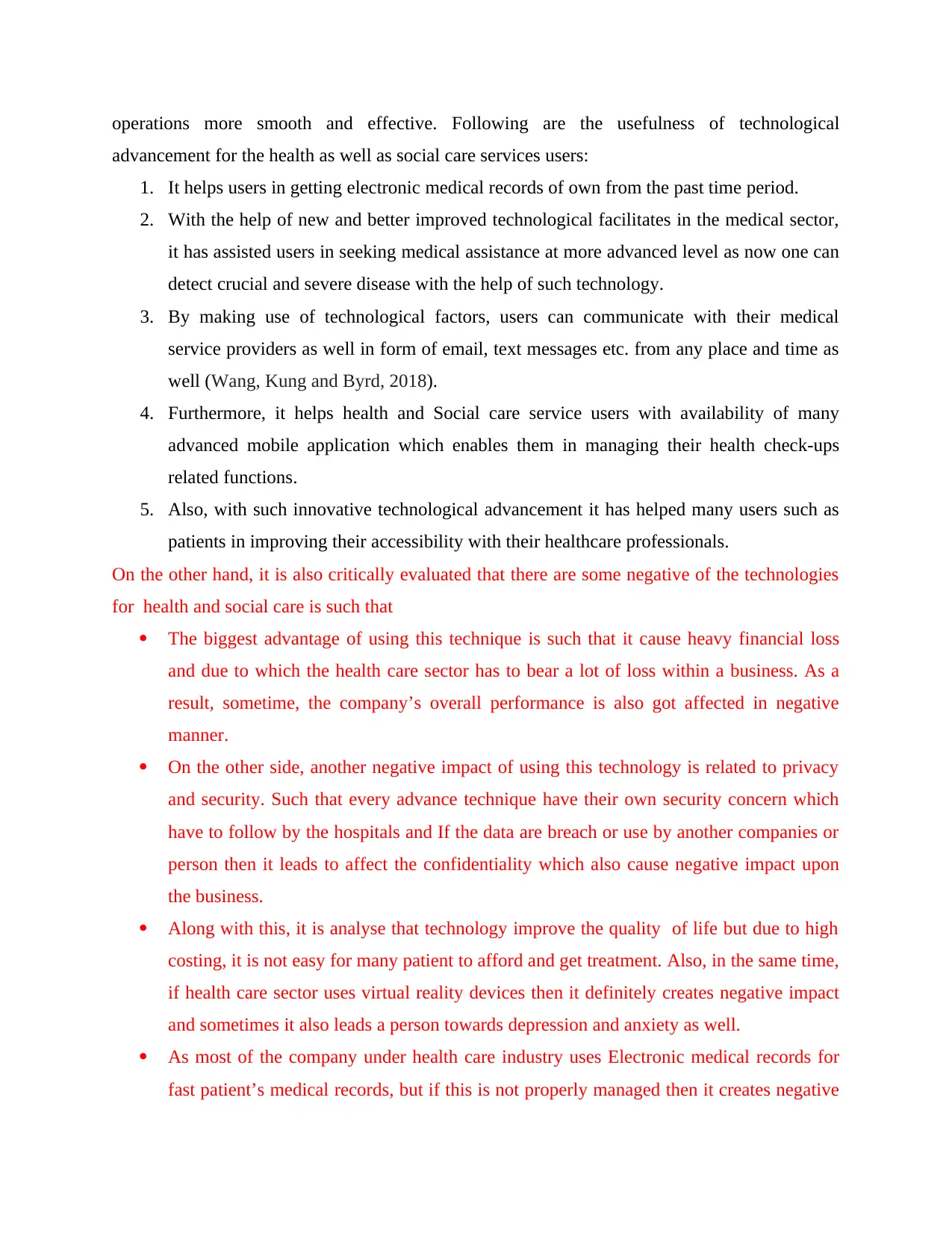
operations more smooth and effective. Following are the usefulness of technological
advancement for the health as well as social care services users:
1. It helps users in getting electronic medical records of own from the past time period.
2. With the help of new and better improved technological facilitates in the medical sector,
it has assisted users in seeking medical assistance at more advanced level as now one can
detect crucial and severe disease with the help of such technology.
3. By making use of technological factors, users can communicate with their medical
service providers as well in form of email, text messages etc. from any place and time as
well (Wang, Kung and Byrd, 2018).
4. Furthermore, it helps health and Social care service users with availability of many
advanced mobile application which enables them in managing their health check-ups
related functions.
5. Also, with such innovative technological advancement it has helped many users such as
patients in improving their accessibility with their healthcare professionals.
On the other hand, it is also critically evaluated that there are some negative of the technologies
for health and social care is such that
The biggest advantage of using this technique is such that it cause heavy financial loss
and due to which the health care sector has to bear a lot of loss within a business. As a
result, sometime, the company’s overall performance is also got affected in negative
manner.
On the other side, another negative impact of using this technology is related to privacy
and security. Such that every advance technique have their own security concern which
have to follow by the hospitals and If the data are breach or use by another companies or
person then it leads to affect the confidentiality which also cause negative impact upon
the business.
Along with this, it is analyse that technology improve the quality of life but due to high
costing, it is not easy for many patient to afford and get treatment. Also, in the same time,
if health care sector uses virtual reality devices then it definitely creates negative impact
and sometimes it also leads a person towards depression and anxiety as well.
As most of the company under health care industry uses Electronic medical records for
fast patient’s medical records, but if this is not properly managed then it creates negative
advancement for the health as well as social care services users:
1. It helps users in getting electronic medical records of own from the past time period.
2. With the help of new and better improved technological facilitates in the medical sector,
it has assisted users in seeking medical assistance at more advanced level as now one can
detect crucial and severe disease with the help of such technology.
3. By making use of technological factors, users can communicate with their medical
service providers as well in form of email, text messages etc. from any place and time as
well (Wang, Kung and Byrd, 2018).
4. Furthermore, it helps health and Social care service users with availability of many
advanced mobile application which enables them in managing their health check-ups
related functions.
5. Also, with such innovative technological advancement it has helped many users such as
patients in improving their accessibility with their healthcare professionals.
On the other hand, it is also critically evaluated that there are some negative of the technologies
for health and social care is such that
The biggest advantage of using this technique is such that it cause heavy financial loss
and due to which the health care sector has to bear a lot of loss within a business. As a
result, sometime, the company’s overall performance is also got affected in negative
manner.
On the other side, another negative impact of using this technology is related to privacy
and security. Such that every advance technique have their own security concern which
have to follow by the hospitals and If the data are breach or use by another companies or
person then it leads to affect the confidentiality which also cause negative impact upon
the business.
Along with this, it is analyse that technology improve the quality of life but due to high
costing, it is not easy for many patient to afford and get treatment. Also, in the same time,
if health care sector uses virtual reality devices then it definitely creates negative impact
and sometimes it also leads a person towards depression and anxiety as well.
As most of the company under health care industry uses Electronic medical records for
fast patient’s medical records, but if this is not properly managed then it creates negative
Secure Best Marks with AI Grader
Need help grading? Try our AI Grader for instant feedback on your assignments.

impact upon the performance and decrease accountability as well as reduce malpractice
too, which affect the overall performance in negative manner.
too, which affect the overall performance in negative manner.
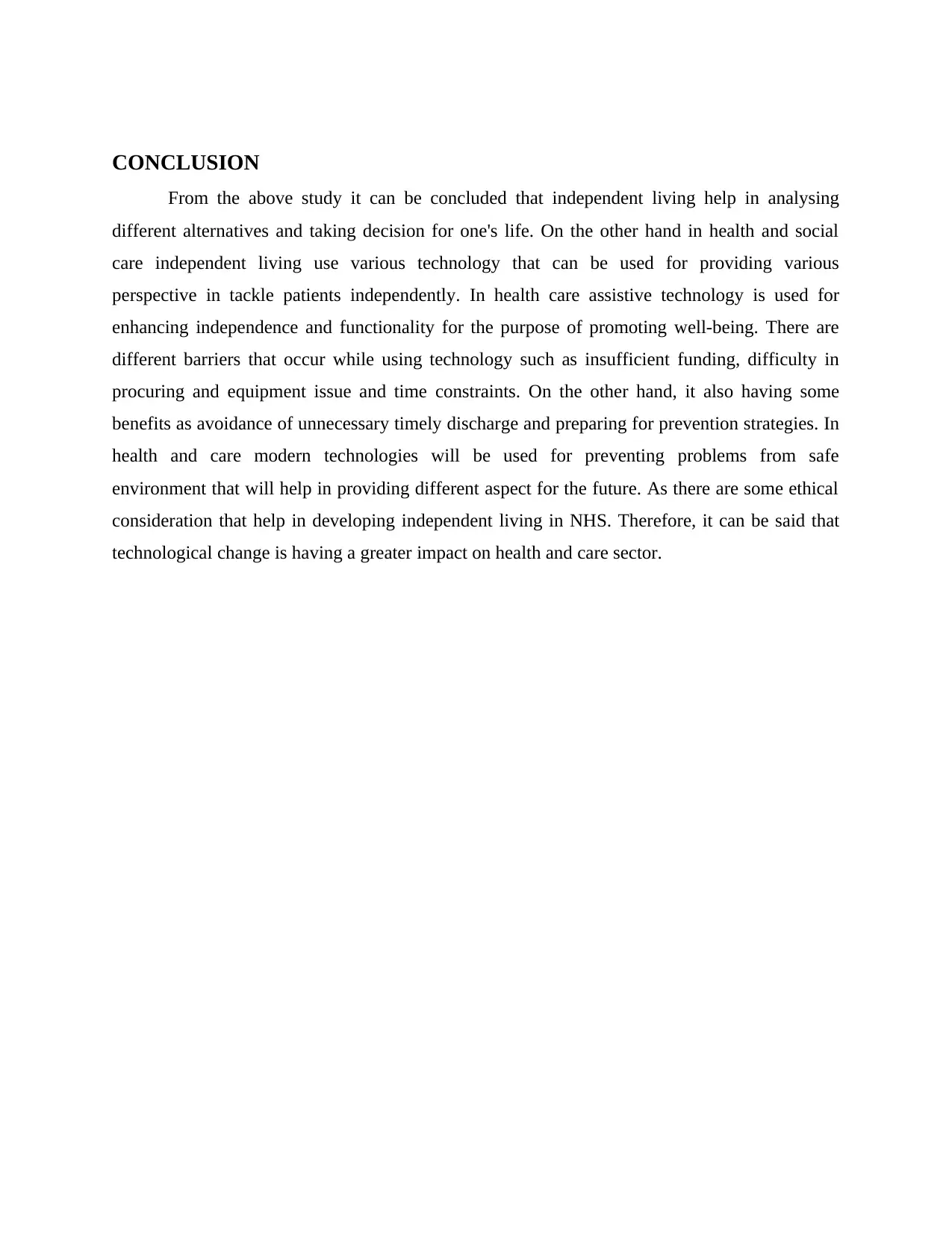
CONCLUSION
From the above study it can be concluded that independent living help in analysing
different alternatives and taking decision for one's life. On the other hand in health and social
care independent living use various technology that can be used for providing various
perspective in tackle patients independently. In health care assistive technology is used for
enhancing independence and functionality for the purpose of promoting well-being. There are
different barriers that occur while using technology such as insufficient funding, difficulty in
procuring and equipment issue and time constraints. On the other hand, it also having some
benefits as avoidance of unnecessary timely discharge and preparing for prevention strategies. In
health and care modern technologies will be used for preventing problems from safe
environment that will help in providing different aspect for the future. As there are some ethical
consideration that help in developing independent living in NHS. Therefore, it can be said that
technological change is having a greater impact on health and care sector.
From the above study it can be concluded that independent living help in analysing
different alternatives and taking decision for one's life. On the other hand in health and social
care independent living use various technology that can be used for providing various
perspective in tackle patients independently. In health care assistive technology is used for
enhancing independence and functionality for the purpose of promoting well-being. There are
different barriers that occur while using technology such as insufficient funding, difficulty in
procuring and equipment issue and time constraints. On the other hand, it also having some
benefits as avoidance of unnecessary timely discharge and preparing for prevention strategies. In
health and care modern technologies will be used for preventing problems from safe
environment that will help in providing different aspect for the future. As there are some ethical
consideration that help in developing independent living in NHS. Therefore, it can be said that
technological change is having a greater impact on health and care sector.
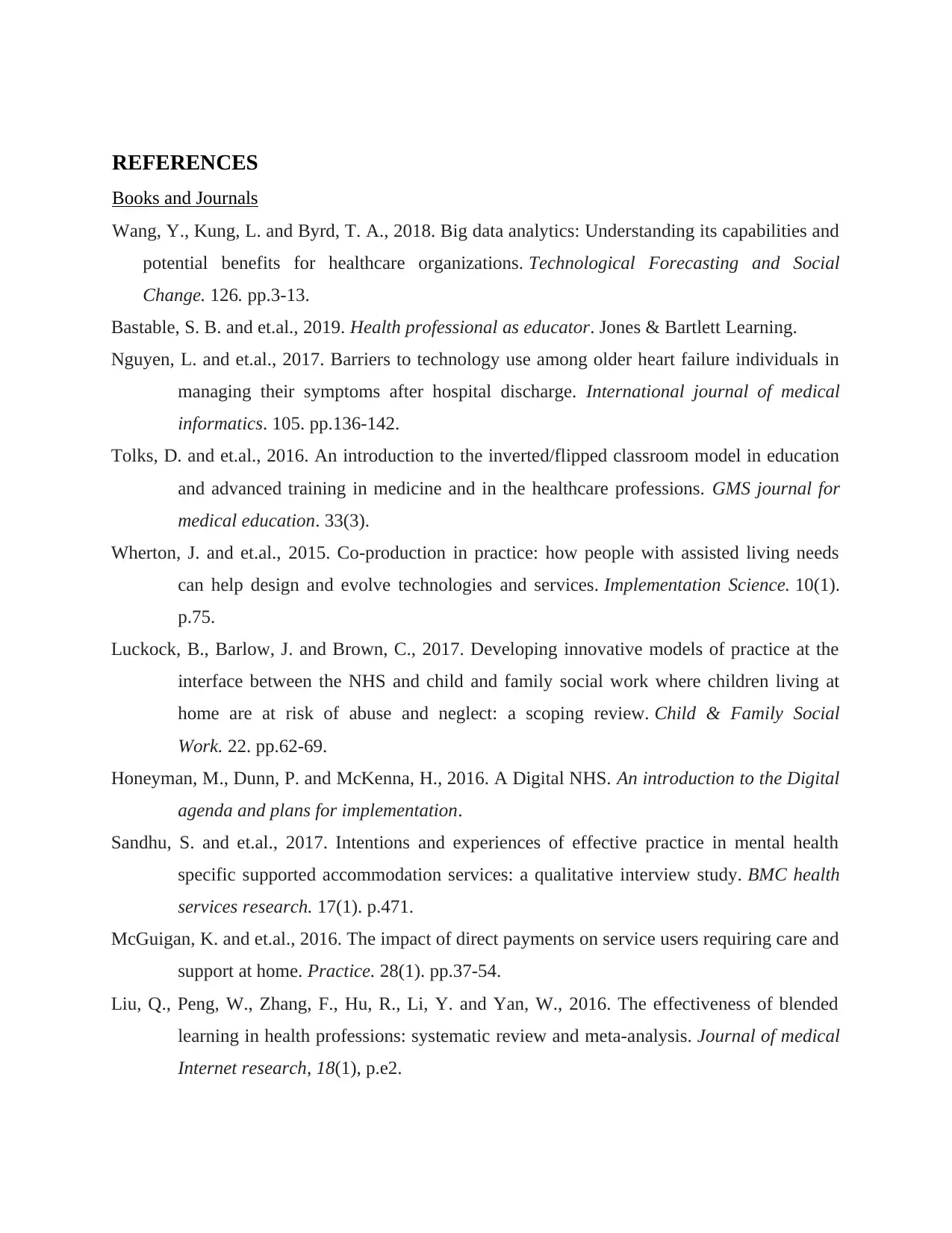
REFERENCES
Books and Journals
Wang, Y., Kung, L. and Byrd, T. A., 2018. Big data analytics: Understanding its capabilities and
potential benefits for healthcare organizations. Technological Forecasting and Social
Change. 126. pp.3-13.
Bastable, S. B. and et.al., 2019. Health professional as educator. Jones & Bartlett Learning.
Nguyen, L. and et.al., 2017. Barriers to technology use among older heart failure individuals in
managing their symptoms after hospital discharge. International journal of medical
informatics. 105. pp.136-142.
Tolks, D. and et.al., 2016. An introduction to the inverted/flipped classroom model in education
and advanced training in medicine and in the healthcare professions. GMS journal for
medical education. 33(3).
Wherton, J. and et.al., 2015. Co-production in practice: how people with assisted living needs
can help design and evolve technologies and services. Implementation Science. 10(1).
p.75.
Luckock, B., Barlow, J. and Brown, C., 2017. Developing innovative models of practice at the
interface between the NHS and child and family social work where children living at
home are at risk of abuse and neglect: a scoping review. Child & Family Social
Work. 22. pp.62-69.
Honeyman, M., Dunn, P. and McKenna, H., 2016. A Digital NHS. An introduction to the Digital
agenda and plans for implementation.
Sandhu, S. and et.al., 2017. Intentions and experiences of effective practice in mental health
specific supported accommodation services: a qualitative interview study. BMC health
services research. 17(1). p.471.
McGuigan, K. and et.al., 2016. The impact of direct payments on service users requiring care and
support at home. Practice. 28(1). pp.37-54.
Liu, Q., Peng, W., Zhang, F., Hu, R., Li, Y. and Yan, W., 2016. The effectiveness of blended
learning in health professions: systematic review and meta-analysis. Journal of medical
Internet research, 18(1), p.e2.
Books and Journals
Wang, Y., Kung, L. and Byrd, T. A., 2018. Big data analytics: Understanding its capabilities and
potential benefits for healthcare organizations. Technological Forecasting and Social
Change. 126. pp.3-13.
Bastable, S. B. and et.al., 2019. Health professional as educator. Jones & Bartlett Learning.
Nguyen, L. and et.al., 2017. Barriers to technology use among older heart failure individuals in
managing their symptoms after hospital discharge. International journal of medical
informatics. 105. pp.136-142.
Tolks, D. and et.al., 2016. An introduction to the inverted/flipped classroom model in education
and advanced training in medicine and in the healthcare professions. GMS journal for
medical education. 33(3).
Wherton, J. and et.al., 2015. Co-production in practice: how people with assisted living needs
can help design and evolve technologies and services. Implementation Science. 10(1).
p.75.
Luckock, B., Barlow, J. and Brown, C., 2017. Developing innovative models of practice at the
interface between the NHS and child and family social work where children living at
home are at risk of abuse and neglect: a scoping review. Child & Family Social
Work. 22. pp.62-69.
Honeyman, M., Dunn, P. and McKenna, H., 2016. A Digital NHS. An introduction to the Digital
agenda and plans for implementation.
Sandhu, S. and et.al., 2017. Intentions and experiences of effective practice in mental health
specific supported accommodation services: a qualitative interview study. BMC health
services research. 17(1). p.471.
McGuigan, K. and et.al., 2016. The impact of direct payments on service users requiring care and
support at home. Practice. 28(1). pp.37-54.
Liu, Q., Peng, W., Zhang, F., Hu, R., Li, Y. and Yan, W., 2016. The effectiveness of blended
learning in health professions: systematic review and meta-analysis. Journal of medical
Internet research, 18(1), p.e2.
Paraphrase This Document
Need a fresh take? Get an instant paraphrase of this document with our AI Paraphraser
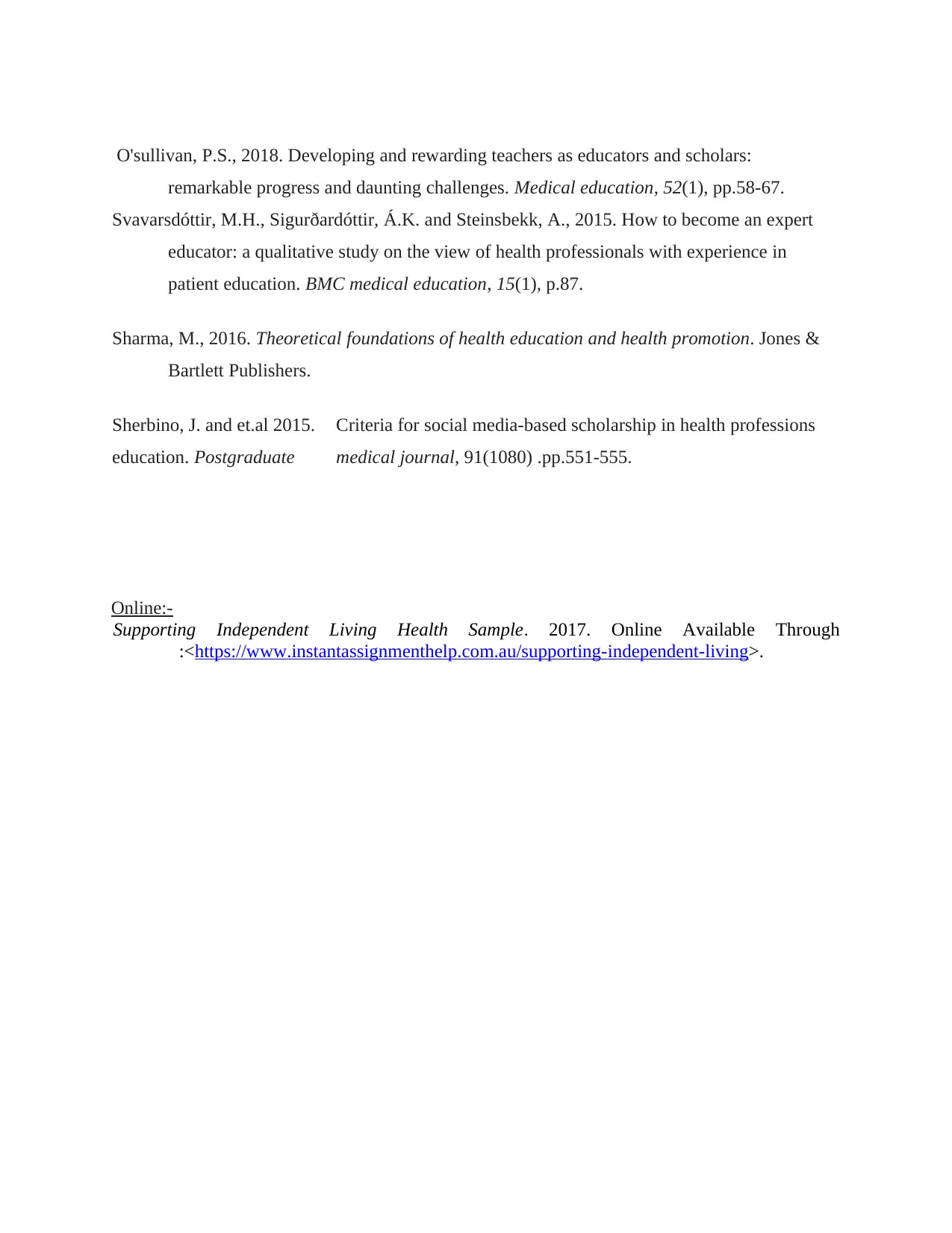
O'sullivan, P.S., 2018. Developing and rewarding teachers as educators and scholars:
remarkable progress and daunting challenges. Medical education, 52(1), pp.58-67.
Svavarsdóttir, M.H., Sigurðardóttir, Á.K. and Steinsbekk, A., 2015. How to become an expert
educator: a qualitative study on the view of health professionals with experience in
patient education. BMC medical education, 15(1), p.87.
Sharma, M., 2016. Theoretical foundations of health education and health promotion. Jones &
Bartlett Publishers.
Sherbino, J. and et.al 2015. Criteria for social media-based scholarship in health professions
education. Postgraduate medical journal, 91(1080) .pp.551-555.
Online:-
Supporting Independent Living Health Sample. 2017. Online Available Through
:<https://www.instantassignmenthelp.com.au/supporting-independent-living>.
remarkable progress and daunting challenges. Medical education, 52(1), pp.58-67.
Svavarsdóttir, M.H., Sigurðardóttir, Á.K. and Steinsbekk, A., 2015. How to become an expert
educator: a qualitative study on the view of health professionals with experience in
patient education. BMC medical education, 15(1), p.87.
Sharma, M., 2016. Theoretical foundations of health education and health promotion. Jones &
Bartlett Publishers.
Sherbino, J. and et.al 2015. Criteria for social media-based scholarship in health professions
education. Postgraduate medical journal, 91(1080) .pp.551-555.
Online:-
Supporting Independent Living Health Sample. 2017. Online Available Through
:<https://www.instantassignmenthelp.com.au/supporting-independent-living>.
1 out of 14
Related Documents
Your All-in-One AI-Powered Toolkit for Academic Success.
+13062052269
info@desklib.com
Available 24*7 on WhatsApp / Email
![[object Object]](/_next/static/media/star-bottom.7253800d.svg)
Unlock your academic potential
© 2024 | Zucol Services PVT LTD | All rights reserved.





